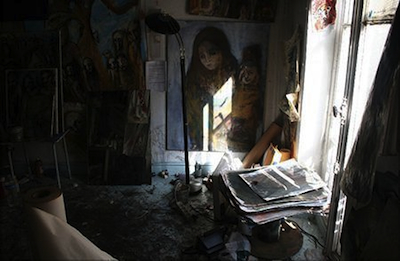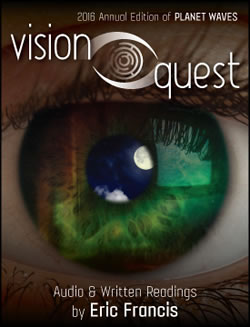by Kemp Battle
There is one fact none of us want to talk about. Not only do we not want to talk about it, we have collectively agreed to insist it is not even true: we are all dying. However robust our health, or confident our outlook, each of us is moving toward our own death every day. As the Buddhists say, we are all burning houses.

Photo by Eric Francis
How reluctant we are to acknowledge either smoke or flame! We rely on one another to act as if our lives are never-ending narratives. We cram our calendars with urgent tasks and hoard our grievances and triumphs as if they are meaningful. We demand the future will be a promise that must be kept, while on and on the noiseless clock ticks.
Each day, however, some learn that their life is coming to an end. In a doctor’s office or a hospital room or even in the stillness of their own homes, they are told that they can no longer pretend. They are thrown out of Eden into the pitiless world of visible time.
In that singular moment, at the start of the most momentous journey they will undertake since birth, something unexpected often happens — something worse even than the prospect of impending death. As the spontaneous laughter around them fades, as singing gives way to whispers or pity is offered instead of presence, it becomes clear that everyone around them is acting differently. Interest in what they might be experiencing is suffocated by newfound sorrow, concern and compassion from those around them.
And so, at the one moment common to all of humanity, they find themselves alone, banished from the tribe. They no longer belong.
How did this happen so fast? Who turned them out into this lusterless land of diminishing horizons?
We did.
Yes, us. We the very family, caregivers, friends who tend their afflictions with kindness, who offer them comfort and devotion. And how do we do it? We tell ourselves we cannot go where they are going and so we send them on alone. And we hold a prejudice so deep that we ourselves will not acknowledge it: we resent them.
They have broken their pact with us. They have named the thing that must not be named. They demonstrate to us that someday — just around the corner, or way down the line — it will be us. And so the dying bring us back to a fear that has long stalked us: the inevitability of loss.
It is the same the world over, whether in the crowded communities of Mumbai or the back streets of Saugerties: those who are dying explicitly challenge those of us who think we are not. And at stake is the very question of belonging.
The same challenge is true for all of us as we play out our roles in society. How we are perceived often matters more than who we are. Worse still, we are convinced that what we do is who we are. So when we can no longer do what we are known for (by bad luck, adverse circumstances or simple retirement), we come face to face with the same isolation the dying know.
When executives lose their jobs, leaders lose their power, and individuals lose their status, position or prestige, those around them are quick to distance themselves. To abandon those losing identity is simply the chosen response by those of us unwilling to admit that our position in the world will also one day change. We cannot bear to be too close to those who no longer seem relevant. Like the dying, they remind us of a most perilous truth: our time will come.
And yet, take heart. All is not what it seems. Those whose health is fast fading or whose identity has been annihilated by circumstances, often have profound lessons to teach us. They do not abandon us. They are on a journey for us as much as for themselves. Their grief, their pain, can be transformed into wisdom as they say yes to us, and to the world, in the face of overwhelming grief.
Elisabeth Kubler-Ross understood and parsed the sequence. Denial, anger, bargaining, depression, acceptance — she named the dying’s stations of the cross. All of us who have had the privilege of working with them know the redemption that brave souls achieve in their final days and hours (if we help them stay free of pain). Along the way, they teach us to slow time down (a brief afternoon in a hospice room can feel timeless and momentous); they model presence in this luscious, radiant moment. Above all, they elegantly demonstrate how to meet head-on what we fear most.
So here’s the good news: If we can keep the faith with our dying companions (or those who face the death of their cherished identity), if we can allow them to walk their journey and stay by their side in attention, curiosity and grateful amazement, they can become our singular teachers. In offering our un-conflicted presence, we are rewarded with wisdom.
By facing life as it is (instead of how we want it to be) we enter a country beyond fear that is rich, varied and fulfilling. Why else do the dying, near their end, seem to grow in presence? They seem more grateful, more familiar with the miracle of living. So too, do those who lost what they thought was their only role in life discover they were being led to an entirely new identity in the world.
All those who are dying to themselves are living a powerful truth: in dying, we are reborn; in leaving, we arrive; in voyaging out, we are carried home — to ourselves, to our human family, to this whole marvelous web of life.
And in arriving home, we realize that we never left.
We all belong and we always have.
Kemp Battle is the author of three books. He works as a management consultant working with organizations around the world and is a grateful hospice volunteer.


* I posted this on the main page first before deciding it might ought to be over here*
As soon as I saw this piece I was grateful that this topic had been given a strong presence here. So thank you, Kemp, for this moving piece. And thank you, Eric, for including it.
What strikes a meaningful chord in me is the idea of treating the dying differently. I have seen this my whole life and it pains me greatly. When I was 18, my father developed a cancerous brain tumor and was given 6 months to live. Because it was the brain that was affected, my robust, masculine, backbone-of-a-father rapidly became very childlike in his actions. Whereas everyone else descended into baby talk and baby gesturing with him, I continued to talk to him as though he just got through plowing the field. There was already an unspoken — unSPEAKable, even — connection between us and I know this sensitivity to his condition was appreciated. His actual death was one of the most peaceful and inspiring moments I could have witnessed, taking with it any trace of fear in me that might have centered around death.
Since then, I myself have died many times. A literal beyond-the-body experience during the dark ages of HIV/AIDS took me to a place of fully understanding what exists beyond this realm is nothing but transcendent peace and support. My other deaths have been the removal of status and “who I think I am” via positions and accomplishments. The stripping away process was unpleasant — including the stripping of “friends” nowhere to be found thereafter — but without all that, I would truly be lost, lonely, tired, and sick today.
What you actually brought here, Kemp, is the key to life as I see it.
In appreciation –
Rob
Dear Kemp, Thank you for a most enlightening and wise writing. It is a major struggle, especially in these times of instant “friending” and fame (and ignominity) on facebook and online, to separate who we are from the persona. I recently read that the ego is nothing more than a collection of bruises and grievances. This truth strikes home, as do your observations. In appreciation.
Thanks for finally including some writing on this topic, which in my view becomes more important the older I get.